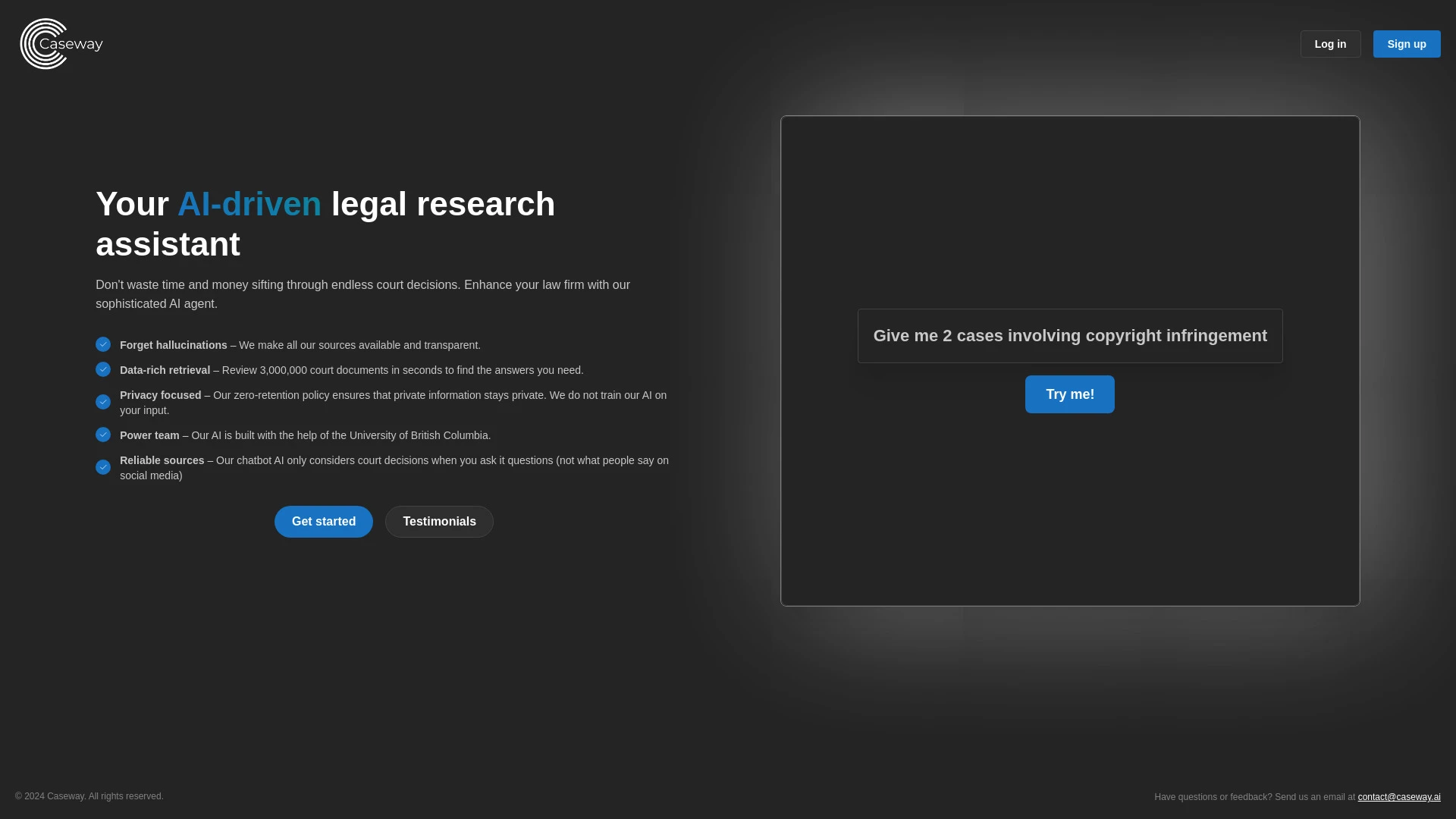Casetext contre Caseway AI
Casetext et Caseway AI sont des plateformes de recherche juridique innovantes. Casetext, lancé en 2013, propose des outils avancés alimentés par l'IA comme CoCounsel pour l'écriture et la recherche juridique, ciblant les cabinets d'avocats et les avocats indépendants. Caseway AI, produit de Kliwise de 2021, se concentre sur la gestion des cas et est destiné aux petites et moyennes entreprises, améliorant l'efficacité grâce à l'automatisation.


Casetext
Idéal Pour
Solo et petits cabinets d'avocats
Grands cabinets d'avocats
Départements juridiques internes
Litigateurs
Forces Clés
Efficacité accrue dans les tâches juridiques
Économise du temps dans la préparation des documents
Fournit des informations précises et complètes
Fonctionnalités principales
Révision de contrat automatisée
Identification de documents critiques
Génération de mémos de recherche juridique
Extraction d'informations clés
Plans de déposition détaillés
Caseway AI
Idéal Pour
Accédez rapidement aux jurisprudences pertinentes pour les questions juridiques
Rationalisez les flux de recherche pour les professionnels du droit
Identifiez les précédents qui affectent les affaires en cours
Améliorez la productivité des cabinets d'avocats
Forces Clés
Réduit significativement le temps de recherche
Augmente la précision des résultats juridiques
Garantit la confidentialité et la sécurité des données
Fonctionnalités principales
Traitement rapide des décisions de justice
Récupération de sources transparente et fiable
Politique de zéro conservation pour la vie privée des utilisateurs
Recherche ciblée pour des demandes juridiques spécifiques
Interface utilisateur intuitive
Popularité
À un coup d'œil
Casetext offre une recherche juridique complète et une analyse de documents alimentée par l'IA, excellant dans la génération de résumés et les insights en litige. Ses fonctionnalités s'adressent aux cabinets d'avocats recherchant de la profondeur. Caseway AI se concentre sur une gestion de cas rationalisée et des interfaces conviviales, idéales pour les praticiens indépendants. Les avantages de Casetext incluent des ressources étendues, tandis que ses inconvénients sont le coût et la complexité. Pour Caseway, la facilité d'utilisation est un plus, mais il manque de profondeur. Choisissez Casetext pour une recherche approfondie et Caseway pour la simplicité.
Tarification et Plans dAbonnement
Casetext propose des prix échelonnés avec des plans commençant à 89$/mois pour les praticiens indépendants, augmentant pour les équipes plus importantes ayant besoin d'analyses avancées. Des frais supplémentaires s'appliquent pour des fonctionnalités premium. Caseway AI fournit un modèle plus simple, commençant à environ 49$/mois, sans coûts cachés, séduisant les petites entreprises. Pour les plus grandes entreprises, Casetext peut offrir des outils plus complets, tandis que Caseway AI est économique pour les startups, les rendant des options rentables en fonction de la taille.
Métriques de performance
Casetext surpasse Caseway AI en précision, délivrant des insights juridiques précis, surtout dans l'analyse complexe de la jurisprudence. Cependant, Caseway AI excelle en vitesse, fournissant des résultats plus rapides pour des requêtes plus simples. Les deux plateformes montrent une haute fiabilité, mais la performance de Casetext se distingue dans les arguments juridiques nuancés tandis que Caseway est meilleur pour la récupération rapide d'informations.
Expérience Utilisateur
Casetext offre une interface conviviale avec une navigation intuitive, facilitant l'accès rapide aux fonctionnalités pour les utilisateurs. Ses options personnalisables améliorent l'expérience utilisateur, tandis que des ressources de support complètes, y compris des tutoriels et un service client, réduisent la courbe d'apprentissage. Caseway AI, bien qu'efficace, peut présenter une courbe d'apprentissage plus raide en raison de son interface plus complexe. Cependant, il fournit des outils de navigation essentiels et un support pour aider les utilisateurs.
Intégrations et compatibilité
Casetext s'intègre parfaitement avec des outils comme Microsoft Word et Google Docs, améliorant les flux de travail de recherche juridique. Caseway AI prend en charge les intégrations avec des plates-formes telles que Clio et MyCases, favorisant une gestion efficace des affaires. Les deux systèmes rationalisent efficacement les opérations juridiques existantes.
Limitations et inconvénients
Les limitations de Casetext incluent la dépendance à des juridictions spécifiques et la variation de la précision des documents tandis que Caseway AI peut manquer de couverture de données complète et d'adaptabilité. Les deux peuvent mal interpréter les nuances juridiques. Les solutions de contournement incluent la vérification croisée avec des sources autorisées et des revues manuelles.